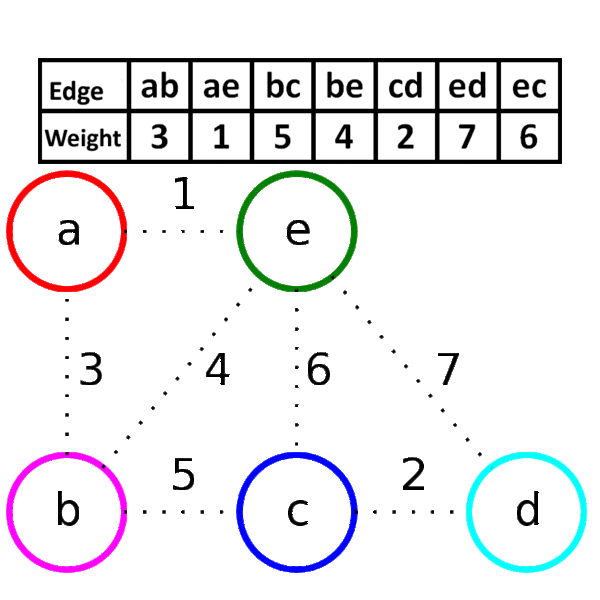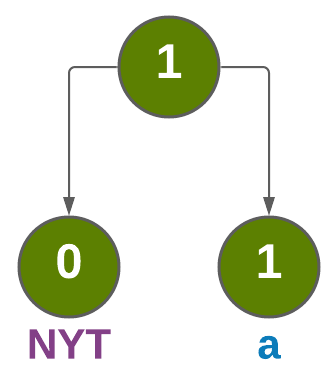Kruskal’s Algorithm
Kruskal’s algorithm is a greedy algorithm for solving the problem of finding a minimal spanning tree (MST) in a weighted and undirected graph. The goal is to find a subset of edges that will create a tree which contains all the original vertices, where the sum of the weights “Weighted graph” of all the edges in the tree is minimized.
Steps
- create a forest $F$ (a set of trees), where each vertex in the graph is a separate tree
- create a set $S$ containing all the edges in the graph
- while $S$ is nonempty and $F$ is not yet spanning
- remove an edge with minimum weight from $S$
- if the removed edge connects two different trees then add it to the forest $F$, combining two trees into a single tree
At the termination of the algorithm, the forest forms a minimum spanning forest of the graph. If the graph is connected, the forest has a single component and forms a minimum spanning tree.
Time Complexity
Time complexity mostly affected by sorting the edges at the beginning of the algorithm. In graph $G=(V,E)$ the time complexity is $O(|E| \cdot \log |V|)$ . If the edges of $G$ are pre-sorted then the time complexity is $O(|E| \cdot \alpha (|V|))$ and $ \alpha $ is the Ackermann function which measured as $ \alpha (n)≅O(1)$ .
Algorithm Pseudocode
Kruskal(G): // O(|E|log|V|)
create Tree T ⇐ ∅
for each v∈V(G) do: // O(|V|)
MakeSet(v)
end-for
// sort E in increasing order by edges weight
Sort(E(G)) // O(|E|log|V|)
for each e∈E(G) do: // O(|E|)
if FindSet(e.u) ≠ FindSet(e.v) then:
T.add(e)
Union(e.u, e.v) //𝑶(α(V)) ≅ 𝑶(𝟏)
end-if
if |E(T)| = |V(G)|-1 then:
return T
end-if
end-for
return T
end-Kruskal
MakeSet(v): // O(1)
v.parent ⇐ v
end-MakeSet
FindSet(v): //𝑶(α(V)) ≅ 𝑶(𝟏)
if v = v.parent then:
return v.parent
else:
return FindSet(v.parent)
end-if
end-FindSet
Union(u,v): //𝑶(α(V)) ≅ 𝑶(𝟏)
uRoot ⇐ FindSet(u)
vRoot ⇐ FindSet(v)
uRoot.parent ⇐ vRoot
end-Union
Return the sum of weights of all the MST
SumOfMST(G):
sum ⇐ 0
T ⇐ Kruskal(G)
for each e∈E(T) do:
sum ⇐ sum + e.weight
end-for
return sum
end-SumOfMST
Maximum Spanning Tree
MaximumSpanningTreeSum(G)
for each e∈E(G) do:
e.weight ⇐ (-1)*(e.weight)
end-for
T ⇐ Kruskal(G)
sum ⇐ 0
for each e∈E(T) do:
e.weight ⇐ (-1)*(e.weight)
sum ⇐ sum + e.weight
end-for
return sum
end-MaximumSpanningTreeSum
Java Code Version
public class Kruskal {
private Edge[] graph, tree;
private DisjointSets group;
private int node_size, tree_size;
public Kruskal(Edge[] g) {
this.graph = new Edge[g.length];
for(int i = 0; i < g.length; i++) {
graph[i] = new Edge(g[i].v, g[i].u, g[i].weight);
}
node_size = 0;
tree_size = 0;
for(Edge edge : graph) {
if(edge.v > node_size) node_size = edge.v;
if(edge.u > node_size) node_size = edge.u;
}
node_size++;
group = new DisjointSets(node_size);
tree = new Edge[node_size-1];
for (int i = 0; i < node_size; i++) {
group.make_set(i);
}
findMTS();
}
private void findMTS() {
Arrays.sort(graph); // O(|E|log|E|)
for(Edge edge : graph) {
if(tree_size < node_size-1) {
if(group.union(edge.v, edge.u)) {
tree[tree_size++] = edge;
}
}
else {
break;
}
}
}
public Edge[] getTree() {
return this.tree;
}
/***************************************************
* DisjointSets CLASS! *****************************
*/
public static class DisjointSets {
private int[] parent, rank; //rank[k]>=height of tree number k
public DisjointSets(int length) {
parent = new int[length];
rank = new int[length];
}
public void make_set(int k) {
parent[k] = k;
rank[k] = 0;
}
public boolean union(int v, int u) {
int root_v = find(v);
int root_u = find(u);
if(root_v == root_u) { // if its equals = there is a circle.
return false;
}
else {
if (rank[root_u] > rank[root_v]) {
parent[root_v] = root_u;
} else if (rank[root_v] > rank[root_u]) {
parent[root_u] = root_v;
} else {
parent[root_v] = root_u;
rank[root_u]++;
}
return true;
}
}
public int find(int v) {
if(parent[v] != v) {
parent[v] = find(parent[v]);
}
return parent[v];
}
}
/***************************************************
* EDGE CLASS! *************************************
*/
public static class Edge implements Comparable<Edge> {
int v, u, weight;
public Edge(int v, int u, int weight) {
this.v = v;
this.u = u;
this.weight = weight;
}
@Override
public String toString() {
return "{" +
"v=" + v +
", u=" + u +
", weight=" + weight +
'}';
}
@Override
public int compareTo(Edge o) {
return Integer.compare(this.weight,o.weight);
}
}
}





Leave a comment